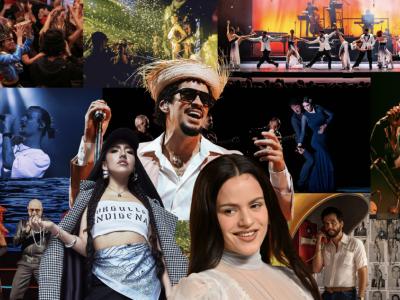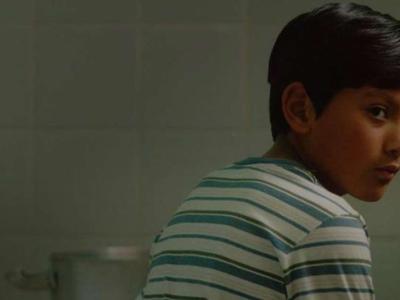I was introduced to Jeremy Bosch in a recent interview I did with Henry Knowles. The famous New York salsa DJ played some of his favourite tracks and Quédate was one of them. As soon as my dancers heard the track they love it and insisted I do a choreography.
We soon fell in love with Jeremy’s amazingly rich voice and his music, which ranges for salsa to reggaetón. But it is the Puerto Rican’s ability to sonear, an increasingly rare skill in today’s Latin pop singers, that stands out, causing the legendary Spanish Harlem Orchestra to snap him up.
Jeremy Bosch’s quality becomes more explicable when you learn that he is a graduate of the prestigious Berklee School of Music, where he was offered a scholarship at the age of 15, not for singing but as a musician. On top of that, he has the charm, intelligence and good looks of any of today’s Latin superstars. But it would be a waste for such a singer to resort to reggaetón and pop in order to perform on that global stage, when salsa music still fills the dancefloors in many clubs.
One of the issues I’ve been discussing with many dancers on my show is the relationship between salsa dancers and live salsa music. We know the salsa dance scene is huge in the UK and all over the world, but do dancers actually appreciate or even listen to the music they dance to? This was the first question I put to Jeremy.
“Dancers in New York are amazing, as you know. This is the birthplace of many dance styles from way back when the Pachanga started, and many dancers here continue to preserve the tradition of enjoying live music, honouring the musicians and interacting with the music that’s being played. Of course, there are others that have grown accustomed to the social dancing and just want DJs, which tends to be about the repertoire that they know, as opposed to the repertoire that they hear. It’s more about the moves that they have practiced and want to show off than the music, and in those cases, there is a disconnect. But there has been a bit of a renaissance in New York of dancers who really enjoy the music and manifest their soul, because of what the music is doing.
Andrea Stewart: One of the things I try to do with my students here in the UK, is to connect the dance with the music and culture. I’d love to know your heritage and background…
Jeremy Bosch: I was born in Ponce, Puerto Rico, which is the birthplace of many of the great Puerto Rican artists, such as Hector Lavoe, Ismael Quintana, La Sonora Ponceña, the family of Eddie Palmieri. My grandmother is from Cuba and my mother is from Venezuela, from a family with a huge lineage of iconic musicians who are very important to the history of Venezuelan music, full all prodigies and virtuosos. My mum plays the cuatro, so my musical talent comes from her side. My dad is a car mechanic. I went to music school and started the flute when I was eight, so I’ve been singing, playing music and composing all my life.
AS: Did you always want to be a singer?
JB: No! Infact, I was always a flute player. I sang briefly in church as a kid but more privately; in our family we all sing pretty well. When Berklee came to Puerto Rico looking for musicians they gave me a scholarship for flute. But, when I arrived in Boston, I was 18 and with no family and even with a full scholarship you have to pay rent and bills. So, I started gigging with a band in Boston and one day was singing, just fooling around and the singer of the band said, from now on I’ll give you all the gigs I can’t play. It wasn’t like I wanted to sing, I was just thinking ‘this is money to pay the rent’. But then gig after gig, my voice starts to get better just through practice, it’s like going to the gym every night. I was soneando and by the time I moved in New York, they had already heard about me. So, I was getting gigs with a lot of bands, that is the way it went. Yeah, officially I was a flute player but singing helped me survive and now I’m like 100% a singer.
AS: In other interviews you’ve done, you’ve talked a lot about your love of Cheo Feliciano, whose songs you've recprded an album of, tell me more about that passion…
JB: Well, I’ve been connected to Cheo since I was a kid. If you’re born and raised in Puerto Rico, you’re raised on his music. My mother had great taste in music, she didn’t like everyone, for example in my household we didn’t listen much to El Gran Combo. That doesn’t mean they are not great, but in our household we went for music that had what we’d call a classier, jazz orientation like Ray Barreto, Bobby Valentin, Roberto Roena y su Apollo Sound, La Sonora Ponceña. All these bands had very peculiar arrangements, El Gran Combo and Frankie Ruiz were more for the people, more simple more afincao. So Cheo, for us, his voice was a perfect combination between a crooner and a rumbero, very unique.
Just from an idiosyncratic perspective, the fact that Cheo is from the same town as me, it’s way more than just his voice. When I left Puerto Rico to go to the US, listening to Cheo was my way of going back home. And then, from a musical and philosophical perspective there are some things you can’t teach, all those years he lived through of heroin addiction, the struggles and process of getting clean. In his voice you can hear the life that he lived and the redemption that he found.
AS: He’s got that thing that he’s lived it…
JB: Yup definitely and many of the great soneros who have been in jail or have been in tremendous trouble have that in commo; the grace, the story telling in their voice that you can’t teach, you can only live it. So yeah, that is what Cheo does to me. And obviously the fact that he was above everyone else as a bolerista, all about the feeling and soul.
AS: It’s Interesting that in your recent playlist of favourites singers you put Cheo as number two and Hector Lavoe as number one…
JB: And as a sonero I put him as number four and Gilberto Santarosa as number one, because Gilberto is like the perfect combination of all of them together clave, line, intellectualism. I mean, for all of those soneros, Cheo was their hero, and obviously I couldn’t keep Ismael Rivera and Cano Estremera out of that list, but Cheo is at another level, as a sonero he’s one of my favourites, but as a singer I mean, there’s a different criteria because it’s not just about the quality of singing. Hector, who is my number one choice, is not the greatest singer, he’s not like a Luis Miguel in terms of quality, but we call him the singer of singers because he had something that became so iconic.
AS: Talking of singing, how did you start singing for The Spanish Harlem Orchestra?
JB: That’s an interesting one! So, I was playing little gigs in New York and one day I was playing in Harlem on a Thursday night and in comes Oscar Hernandez, leader of Spanish Harlem. But it’s not just him, he comes in accompanied with all these legendary cats, with Dandy Rodriguez who used to be Tito Puentes’ band leader, Frankie Vazquez, Giovanni Hidalgo, one of the greatest percussionists in the world. They all walked in and it was kind of embarrassing because here I am playing in a little restaurant.
Here’s the thing: I didn’t know it, but they actually came in specially to see me. Apparently, Oscar Hernandez was looking for a singer and he had already tried several that didn’t convince him. And that night he seemed pretty convinced…but he was also apprehensive at my age. He invited me for breakfast and he was amazed how much I knew about the history of salsa, about Eddie Palmieri, Ray Barretto, Machito, Mario Bauza…I had been studying this music, the afro-Cuban era, since I was 19, so we connected immediately.
AS: What do you think they saw in you that night?
JB: I’m not sure what they saw in me, but I know that when Oscar wants to hire you then everybody wants to hire you, so that was the best thing that happened to me. Even Tito’s old orchestra started ringing me, I sang at Lincoln Centre with them. I think maybe my education helped. You have young musicians, especially percussionists, and many of them do their homework, they know about Chano Pozo, all the greats, but if you talk to singers, not all of them have that much knowledge about singers, they stay in one-dimension. I think what they saw that night is that I have a thirst for learning, and I know my influences Isaac Delgado, Cheo, Gilberto, Ismael…I think there has to be a seriousness about the music, a reverence and a respect. It’s not just a walk in the park…every night you have to bring the work.
AS: I actually work out to Nadie, which has a reggaetón beat, you have so many different styles. What is the true you…
JB: For me, to show who I really am is not as important as the actual journey, the story telling of who I really am, if you see what I mean. Like, I am doing this Cheo Feliciano Album, which is a trilogy, at the Lincoln Centre. The first is called prefacio (preface) because it’s like the preface to a book, and then I do prólogo and with Luis Enrique I do epilogo which is like the 3rd chapter. So these three albums are a 3-Dimensional view of what salsa is in my head. It’s like Kanye producing a salsa album!
AS: So tell us about your current projects and when you think you might be visiting London
JB: I love London! I did four nights at Ronnie Scotts before lockdown. At the moment I’m starting to play again in New York. We’ve created Salsa pa’ la cultura which are events that are all about getting salsa back into the barrios of New York, Queens, the Bronx, which are all sold out. With Spanish Harlem Orchestra we are already getting dates in Europe, but I’d love to develop a tour with my own band, so hopefully we’ll be coming to London soon!
You can watch the live recording of this interview on Andrea’s Dance World, this Sunday at 7pm www.facebook.com/latinolifeuk















